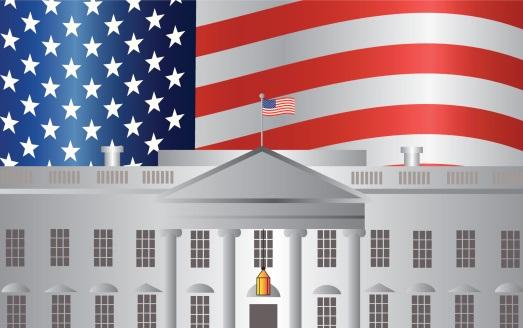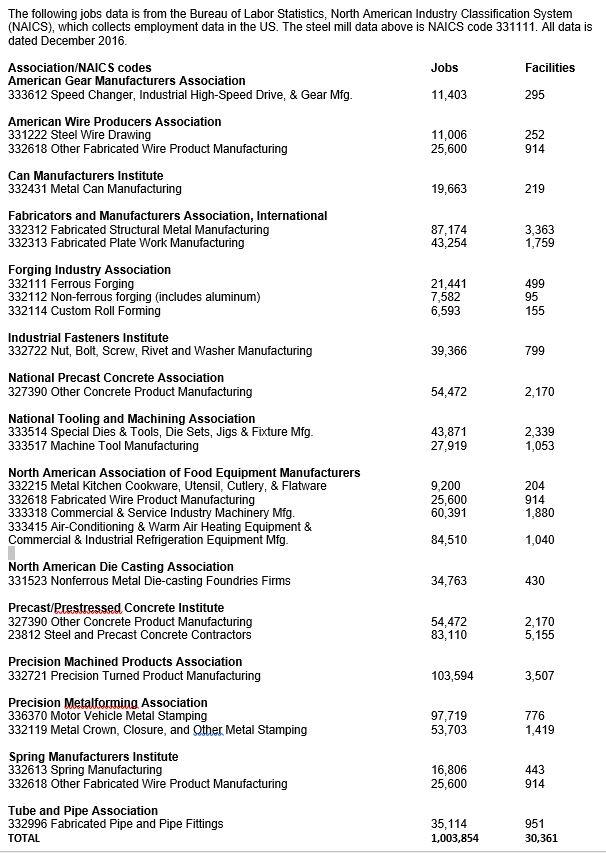President and CEO
- FMA
- The Fabricator
- FABTECH
- Canadian Metalworking
Categories
- Additive Manufacturing
- Aluminum Welding
- Arc Welding
- Assembly and Joining
- Automation and Robotics
- Bending and Forming
- Consumables
- Cutting and Weld Prep
- Electric Vehicles
- En Español
- Finishing
- Hydroforming
- Laser Cutting
- Laser Welding
- Machining
- Manufacturing Software
- Materials Handling
- Metals/Materials
- Oxyfuel Cutting
- Plasma Cutting
- Power Tools
- Punching and Other Holemaking
- Roll Forming
- Safety
- Sawing
- Shearing
- Shop Management
- Testing and Measuring
- Tube and Pipe Fabrication
- Tube and Pipe Production
- Waterjet Cutting
Industry Directory
Webcasts
Podcasts
FAB 40
Advertise
Subscribe
Account Login
Search
Don't forget steel users
Manufacturing associations ask President Trump to be careful in his actions after Section 232 investigation concludes
- By Ed Youdell
- September 12, 2017

Potential actions taken after the conclusion of the Section 232 investigation on steel imports and their impact on national security could seriously hurt U.S. metal manufacturers.
[Editor's Note: The Fabricators & Manufacturers Association President and CEO Ed Youdell was a co-signer to this letter.]
We respectfully submit this letter on behalf of the undersigned associations in connection with the Section 232 investigation of steel imports and their impact on national security.
These associations represent a variety of American industries that buy steel to manufacture many thousands of downstream products, which are essential to the prosperity and national security of the U.S. Our members make everything from steel wire used in control cables and fasteners for military aircraft, fabricated steel plate doors and floors for military vehicles, and many types of machined and formed steel products that improve the life of millions of Americans on a daily basis. Collectively, the members of our associations represent 1,003,854 jobs at 30,631 facilities (see Figure 1), compared with 81,873 jobs at 880 facilities in the U.S. basic steel industry.
Our member companies source the majority of their steel requirements from the domestic steel industry, but they also require continuing access to global supply chains. Downstream steel manufacturers support a strong national defense and a strong domestic steel industry. However, we believe that restrictions on basic steel imports will actually adversely impact national security, the economy, and the steel industry itself.
We are very concerned about the unintended and disastrous consequences which Section 232 restrictions on imports of basic steel products would have on our industries:
- Such restrictions would almost certainly result in shortages of critical raw materials for our companies’ operations, and there are many types of steel products that are simply not available from domestic steel mills.
- Import restrictions under Section 232 would impact both the availability and price of steel raw materials, placing downstream industries at a crippling competitive disadvantage to foreign manufacturers of our products.
- Unavailability and increased costs would force our customers to go offshore to make or buy their products, and this will inevitably result in less demand from domestic steel mills.
- Without a viable customer base—the downstream steel manufacturers and our customers—the domestic steel mills will quickly suffer from less demand and loss of markets.
It would be a tragic result for our country if, by imposing unnecessary and unwarranted restrictions on steel imports, such restrictions not only cause serious damage to our industries, but also undermine the long-term viability of the US steel mills. As evidenced by the more than 160 antidumping and countervailing duty orders in place against 37 countries and 25 categories of basic steel products, the U.S. steel industry has long been successful in protecting itself from unfairly traded steel using the US trade laws.
Accordingly, we respectfully urge you to avoid any decision which would do harm to so many downstream steel manufacturing companies, our employees, and our customers, with little or no additional protection to the basic steel industry.
On behalf of our member companies, we thank you for your consideration.
subscribe now

The Fabricator is North America's leading magazine for the metal forming and fabricating industry. The magazine delivers the news, technical articles, and case histories that enable fabricators to do their jobs more efficiently. The Fabricator has served the industry since 1970.
start your free subscriptionAbout the Author

Ed Youdell
2135 Point Blvd
Elgin, IL 60123
888-394-7702
- Stay connected from anywhere

Easily access valuable industry resources now with full access to the digital edition of The Fabricator.

Easily access valuable industry resources now with full access to the digital edition of The Welder.

Easily access valuable industry resources now with full access to the digital edition of The Tube and Pipe Journal.
- Podcasting
- Podcast:
- The Fabricator Podcast
- Published:
- 04/16/2024
- Running Time:
- 63:29
In this episode of The Fabricator Podcast, Caleb Chamberlain, co-founder and CEO of OSH Cut, discusses his company’s...
- Trending Articles
Tips for creating sheet metal tubes with perforations

Are two heads better than one in fiber laser cutting?

Supporting the metal fabricating industry through FMA

JM Steel triples capacity for solar energy projects at Pennsylvania facility

Omco Solar opens second Alabama manufacturing facility

- Industry Events
16th Annual Safety Conference
- April 30 - May 1, 2024
- Elgin,
Pipe and Tube Conference
- May 21 - 22, 2024
- Omaha, NE
World-Class Roll Forming Workshop
- June 5 - 6, 2024
- Louisville, KY
Advanced Laser Application Workshop
- June 25 - 27, 2024
- Novi, MI



























